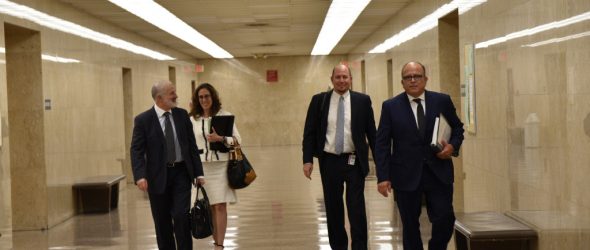Pasadena took itself to court and won.
A judge ruled in the city’s favor Thursday and will soon order the county to remove a proposed cannabis ballot measure from the city’s March ballot.
The initiative would have legalized up to 18 of the city’s illegal cannabis retailers, which currently operate in the city without permits, according to city officials.
To get the case in front of the judge, the City Council had to sue its own city clerk, Mark Jomsky, and the Los Angeles County Registrar-Recorder/County Clerk because they’re the ones who would be responsible for making changes to the controversial ballot initiative signed by more than 9,100 residents.
Jomsky and the county weren’t defending the initiative; that was the responsibility of Granada Hills-based attorney Stanley Kimmel, who represented its proponents. Kimmel, who has represented one of the illegal dispensary owners in criminal matters, did not respond to a request for comment after the hearing.
Under the proposed measure, instead of being subjected to the city’s strict provisions for legal shops, the illegal ones would have had a separate set of rules exempting them from key provisions of the city’s permitting process.
That’s unconstitutional, according to Judge Mary Strobel, who penned a tentative ruling ahead of Thursday’s hearing. After listening to arguments from both sides, she reaffirmed the tentative decision and said an official judgment will be issued Friday.
City Attorney Michelle Bagneris does not expect it to be substantively different from Thursday’s tentative ruling.
Siding with the city, Strobel determined the measure was unconstitutional because it conferred “a special privilege or advantage on specific organizations,” which is specifically barred in California state law, her ruling says.
It was the chief argument made by the city’s outside counsel, Frederic Woocher, a partner at Los Angeles-based law firm Strumwasser & Woocher.
“The purpose of that (law) is to keep somebody from using the initiative power to secure special advantages for themselves,” Woocher said in an interview after the hearing.
Woocher made a second argument in court, saying it was an improper use of a ballot initiative process, which can be used to make legislative changes — such as amendments to the zoning code or adjustments to existing laws — but not administrative changes, such as the issuance of a permit.
By effectively exempting illegal cannabis retailers from the permitting process, the court ruled the initiative “appears to be legislative” on its face, but in truth it was administrative, according to the tentative ruling.
Kimmel tried to frame the issue as something akin to grandfathering the existing stores in. After all, he argued, they were around before Pasadena passed Measure CC, which provided a path for legal cannabis retailers to come into the city but banned any shops that were already operating in Pasadena from applying.
Still, the court didn’t buy it.
“There’s no doctrine that allows grandfathering of illegal uses,” Woocher said after the hearing. “This was really a perverse measure, and I think the court recognized it.”
Pasadena officials and their attorneys left the court smiling on Thursday, but Bagneris said she wouldn’t be surprised if another initiative came around, taking a different approach.
“There’s a lot of money involved,” Woocher said. “Whenever there’s money involved, you never know.”


